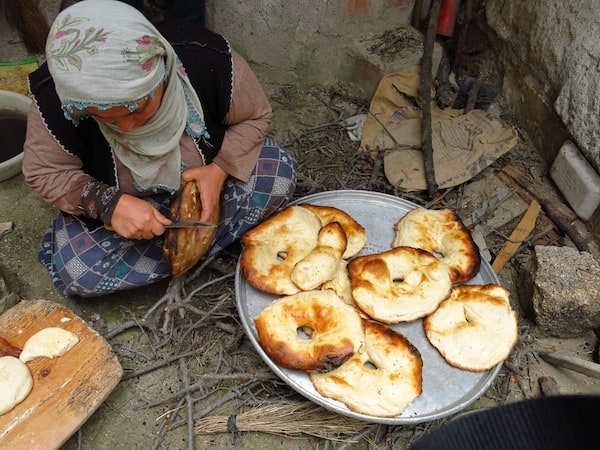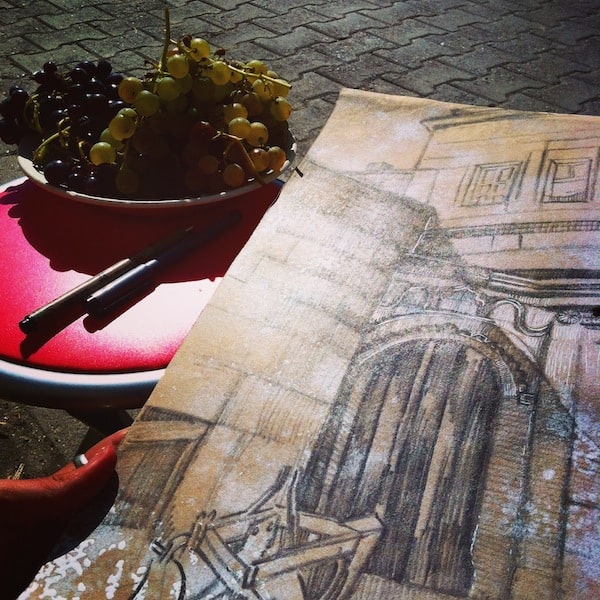After several years of learning Turkish, I can still find myself stumped in the midst of fast-paced conversations. This confusion occurs especially when an idiom is used to enlighten a certain situation. On many occasions, I’ve had to ask in English about what was just said and the explanation usually goes something like this: “In Turkey, we have a saying…” and an idiom is revealed which can seem obscure, comical or strange, yet entirely appropriate at the same time. As I often find myself in the company of Turkish speakers, I’ve slowly been accumulating a number of sayings that seem to attend to any circumstance. Here are just a few that I have come across in my years learning Turkish.

1) “Umut fakirin ekmeğidir”
Literal translation: Hope is the bread of the poor
Meaning: This idiom is used to point out that hope helps sustain many people, as bread does for the poor or needy.
2) “Kalp kalbe karşı”
Literal translation: Heart facing heart
Meaning: Great minds think alike. This saying can be heard when two people offer the same explanation, say the same thing at the same time, or when two people call each other at the same time.
3) “Eski tas, eski hamam”
Literal translation: Old bowl, old hamam
Meaning: The same old story. You may hear this proverb while observing typical behavior from certain parties or individuals.
4) “Üzüm üzüme baka baka kararır”
Literal translation: A grape gets darker as it looks at the other grapes.
Meaning: A person who falls in with bad company gradually acquires their bad habits.

5) “Emek olmadan yemek olmaz”
Literal translation: Without effort and work there is no food.
Meaning: No pain no gain. When you don’t invest in something, the desired result won’t come.
6) “Balık ağa girdikten sonra aklı başına gelir”
Literal translation: A fish only comes to its senses after it is caught in the net.
Meaning: You will only understand a situation when it happens to you.
7) “İnsan yedisinde ne ise yetmişinde de odur”
Literal translation: One will be the same when he is 70, as he was when he was 7.
Meaning: People can change their habits, but their character and identity will remain the same. Another example can be a man who is always making jokes, most likely did the same in his childhood.
8) “Keskin sirke küpüne zarardır”
Literal translation: Strong vinegar damages its container.
Meaning: Hot tempered people will only harm themselves. This idiom may be said when attempting to calm someone down who is angry.

9) “Sakla samanı, gelir zamanı”
Literal translation: Keep the hay and the time to use it will come.
Meaning: Waste not, want not. Don’t throw away even a trivial thing, there might come a day when you will need it.
10) “Damlaya damlaya göl olur”
Literal translation: Drop by drop, it will become a lake.
Meaning: A penny saved is a penny earned. This idiom is used to imply that small savings will lead to substantial wealth, and may be used to encourage young people to save.
11) (One extra, for the road) “Akrabanın akrabaya akrep etmez ettiğini”
Literal translation: Don’t expect even from a scorpion the evil that a relative does to another.
Meaning: The biggest damage will come from the inside, or possibly a very pessimistic view of family members.
Some of these proverbs are often used, while others remain slightly obscure. In any case, listen for them while involved in Turkish conversations, or try them out yourself and you will be sure to impress!
Are there any idioms you’re fond of? If so, share in the comments.
Gabrielle Reeves is a contributor to Yabangee.











I love “maydanoz olma”, or “don’t be a parsley”. It means mind your own business (because parsley is never really a main dish, it just butts its way into other dishes where it has no right to be).
😀 😀 😀 “don’t be a parsley” sounds incredibly funny in English, never considered it that way 😀 😀
Do you know “Ne verirsen elinle o gider seninle” ? You probably hear this idiom from man who stands out of the Camii to collect money for donation.
it is not tas as stone but tas as the cup to pour over yourself in the hammam
Nerede hareket, orada bereket
number 3 is wrong !. the world tas means bowl (they use bowls at the hamam, they fill it up with water and use the bowl of water to wash themselves) and not stone. stone is written different, taş = stone. the difference is in the letter S. the regular s is spoken regularly, and the ş is spoken like “sh” in English. It might be better if you change it 🙂
Istanbul kazan sen kepçe – it means you are traveling a lot within Istanbul area 🙂
Thanks for sharing! It would also be cool that English speakers take their time and patience when it comes to talking with non-English speakers but…. Alas! Of course it doesn’t happen. If you don’t get their idioms and their pace SO SORRY! I mean no offence, just sharing my experience. 😉
My favourite idiom isn’t here! Bedava sirke baldan tatlıdır. Free vinegar is sweeter than honey. 🙂
Just how widely used are these idioms? I’ve been in Turkey 10 years and never heard any of them, though admittedly I’m only intermediate level.
anyone above age 50 uses them extensively. age 35-50 rarely. below 35, almost never.
“İnsan yedisinde ne ise yetmişinde de odur” is mostly used as a negative expression btw. It is commonly used to express “negative things in someone’s character when they are 7, will stay there when they are 70”. The one using this idiom does not believe that people may change for better in time.
Karamanın koyunu sonra çıkar oyunu.
Koyunun olmadığı yerde keçıye Abdulrahman çelebi derler.
Kızım sana söyliyorum gelinım sen dınle.
Kediyi cuvalda aldı.
Hem gider hem ağlar.
Okadar hata kadı kızında da olur.
Camiyi calan kılıfını hazırlar.
Kızını döv dizini döğme.
Yarım ağaz söyle…
Uzum karardikca olgunlasir ,as the grapes get darker they ripen as well so it doesn’t need to be negative
We the people learn from each other as we stare each other , pretty much the story of mankind!
is that like “monkey see, monkey do”?
You are definitely right.
BESLE KARGAYI ,OYSUN GÖZUNU. ASKIN GÖZÜ KÖRDÜR
[…] Speak Turkish with our Turkish friends and colleagues. Maybe dazzle them with some useful Turkish idioms. Emek olmadan yemek […]
#2 Kalp kalbe karsi(ymis), is used when two persons think about the other at the same time, in a good manner. So, when you call someone on the phone, and they were also thinking about you at the same time, they may reply with this. It’s not much about saying the same or thinking alike on a subject. #5, 6 makes somewhat sense but never heard, 9 and 10 have become cliches, so younger people would use them for joking probably. Never heard 11 and it is hard to spell even for a local.